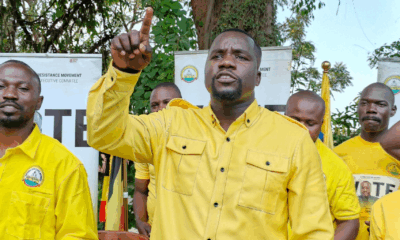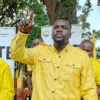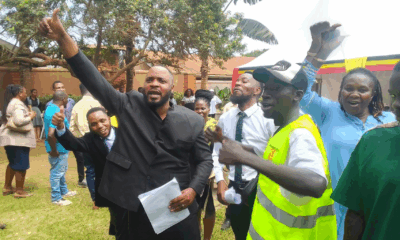Analysis
Imperial Presidency VERSUS Rule of Law
Museveni desecrates Late Chief Justice Benedicto Kiwanuka as he moves to render Judiciary impotent

Even though he presided the late Ben Kiwanuka’s statue at the High Court in Kampala, President Museveni’s actions reflect he has low regard with the Judiciary
If the dead could rise, the late Chief Justice Benedicto Kiwanuka would have surely protested loudly at what President Yoweri Kaguta Tibuhaburwa said during a memorial lecture held in his honour on Tuesday at the High court premises from where Amin’s rascals grabbed him like a common thief never ever to be seen alive or dead to date.
Tibuhaburwa turned the lecture whose import is to amplify the rule of law into one intended to erode the independence of the judiciary, whose primary duty is to uphold the rule of law.
CJ differs, Eyes, Ears on MPs
Credibly and against claims of being a cadre judge, the incumbent Chief Justice Alphonse OwinyDollo has so far lived up to his oath by standing up to the President and telling him to his face how the right to bail is embedded in the 1995 Uganda Constitution and, as such, no one, not even the President, can casually wish it away.
Now, what is awaited is how the national assembly, which is overpopulated by the ruling party NRM MPs, will handle perhaps the greatest human rights fight Ugandans have witnessed in many years.
In Parliament this week, Opposition MPs sought to draw a line that the President cannot breach in his ever expanding power over the affairs of Ugandans, when they refused to attend the plenary on Wednesday in protest over the President’s plan to introduce amendments to the Constitution to remove human rights protections prescribed under the bail conditions.
President Museveni has indicated he is hell bent on wiping out this fundamental right, when he said he has never been its supporter and that he will invite MPs from his party to Kyankwanzi very soon to persuade them to remove it once and for all.
President Museveni has put all previous Parliaments to a big test. This latest affront on bail and the cardinal principle of presumption of innocence until proven guilty appears to be such a test.
Will our lawmakers stand the test and uphold the cause of human rights or they will pander to the whims of their party chairman? While the choice is entirely theirs, the legacy of each and every MP will in future be measured according to how each individual MP voted on this critical issue.
Lessons to Ponder
It has been argued that Museveni’s attack on the independence of the judiciary has more to do with inefficiencies in the investigative arm of the government – CID, DPP and less with the weaknesses of the judiciary.
Others have also argued that the President’s attack on the right to bail, is politically motivated as opposed to addressing crimes.
While speaking on CBS’s Kiriza oba Ggaana evening political talkshow this week, MPs Muwanga Kivumbi and Richard Ssebamala concurred that if the president was sincere about tackling big offenders, he would have brought charges against the many technocrats and private contractors who do shoddy work or deliver substandard goods and services that leads to the death of hundreds of Ugandans on poorly made roads, of in unsupervised maternity wards across the country.
But history is replete with a lot of lessons for our MPs to learn from in order to tread with caution on matters of great importance.
We’ll start with Grace Ibingira, one of those Ugandans God blessed with a super intelligence. In a bid to please his master, Dr. Apollo Milton Obote Opeto, Ibingira weaved a law handing the state a blank cheque to detain anyone without trial.
By influencing Ibingira into crafting that ‘Detention without Trial’ law, Obote didn’t mean well for the country. He just sought to exploit the law to easily imprison people he would deem critical of him and his administration.
When Obote fell out with Ibingira, he used the very law Ibingira crafted for others, to detain him! This is, may be, why Obote chose to live in exile, fearing his law would catch up with him if at all he dared to step a foot in Kampala!
The law of Ibingira and the one Museveni seeks to introduce banning the right to bail, are quite similar, though, different in name. The 1995 Constitution which bars detention without trial also bars the courts of law or anyone else from denying bail to a suspect in case he or she has fulfills conditions set by the trial court.
Whereas the law that Museveni is fighting to introduce leaves the suspect with a right to stand trial, it denies him or her the right to be assumed innocent, by denying him bail just like Ibingira’s law held a suspect guilty without proof.
Zooming through the immediate history, another super thinker, John Patrick AmamaMbabazi looking to please his master, Tibuhaburwa, crafted the public order management act.
A key game planner for Tibuhaburwa at the time, Mbabazi crafted the law in order to make it practically impossible for the Kizza BesigyeS and other opposition politicians to run a smooth campaign.
Come 2016, Museveni used the law crafted by Mbabazi to red card Mbabazi each time Mbabazi would proceed to carry out campaigns!
That said, the framers of the 1995 Uganda Constitution by inserting the right to bail, could have been influenced by the fact that Obote had used Ibingira’s law to target critics who were not necessarily criminals.
Tibuhaburwa versus Benedicto
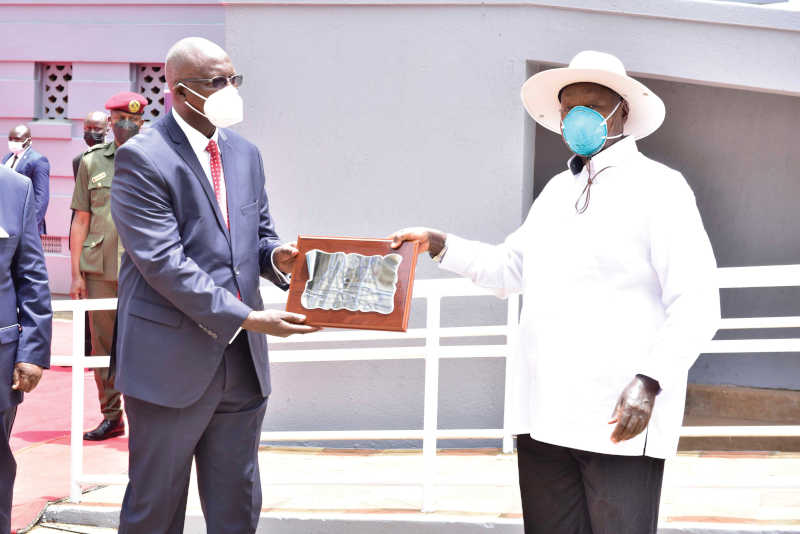
Former Chief Justice Bert Katureebe received the Ben Kiwanuka award from President Museveni
For the sake of readers who might not be aware, Benedicto Kiwanuka paid the ultimate price merely because he refused to bend to Amin’s unlawful directions. Four decades later, Tibuhaburwais directing judges, which itself is wrong remembering that judges are supposed to do their work without undue interference from anybody or authority, to deny bail to suspects.
What Tibuhaburwa is commanding judges to do is close to what Amin did many years ago when the eccentric Field Marshal sat somewhere and dialed Benedicto Kiwanuka, commanding his lordship to deport a Briton he (Amin) wanted out of the country.
Away from that, the President has already in an unmistakable demonstration of the contempt he possibly harbors against the judiciary, re-arrested two prominent members of society in lawmakers Mohammad Ssegirinnya and Allan Ssewanyanacontrary to a court order releasing them on bail.
The duo were, following their release on bail, kidnapped, bundled into the dreaded drone vehicle, the latter day Peugeot 504 saloon car rascals of Amin used to kidnap BenedictoKiwanuka, in a manner not only ideally so demeaning to people in their station of life, but also contrary to the supreme law of the land which bars members of the security forces from treating suspects in the manner the captors ended up treating the two MPs.
The military has since charged the duo with fresh charges of murder on the way to placing them in the arena of the military court against a Constitutional court ruling, barring the military courts from trying civilians.
By Wednesday,the military still held the MPs in detention outside the constitutionally stipulated 48 hours within which suspects are supposed to be arraigned before a competent court of jurisdiction for purposes of reading the charges to them and for applying for bail if need be.
Mob justice?!
In what appears to be a tacit approval of mob justice and in a bid to forcefully drive his point home, Musevenicontends that because judges continue to give bail to suspects he doesn’t feel they merit, a section of Ugandans have resorted to killing suspects out of revenge.
But one would ask; How would the president react if someone were to support rebellion against his government on the ground that he is asking judges to deny bail to suspects which is against the constitution itself?”
Going forward, this was not the first time for Tibuhaburwa to support mob justice. By way of example, the president categorically stated after the shooting of gen Edward Katumba Wamala how soldiers would resort to shooting suspects if the courts continued to give bail to suspects.
Indeed, the soldiers ended up shooting dead four suspects in the attempted murder of KatumbaWamala under the cover that the victims who were chained hands and legs, were trying to escape or disarm them.
While delivering his speech at the Benedicto Kiwanuka memorial lecture, Museveni sounded confusing. He stated on one hand how intentional and reckless killing is unlawful.
He was spot-on. Nevermind that the same president exonerated members of his elite body guards who during and after the elections, shot dead a total of 55 Ugandans.
On the other hand, the Head of State stated that a section of Ugandans are resorting to killing suspects merely because they think courts are doing wrong to give bail to suspects.
Whether the courts are giving bail to suspects wrongly which is not good obviously, it doesn’t justify mob justice for the simple reason that two wrongs do not make one right.
Museveni referenced a story of a rebel who was summarily killed in the bush because he had killed another rebel which, according to him, was fantastic justice.
He stated how the ‘westernized’ Jim Katugugu Muhwezi being a lawyer had advised against the summary execution of Zebulon given the fact that he had killed under the influence of alcohol.
Now, what happened in the bush is distinguishable from what happens in normal life. In the jungles there were no courts of law. This is why Museveni and his kangaroo court executed Zebulon using the jungle law which was the only one available to them.
Even then, just because Museveni used the jungle law to execute Zebulon cannot be used as a justification to summarily execute Allan Ssewanyana or deny him bail, for example, in a normal setting unless when the regime wants us to believe it is still a rebel outfit!
True, the courts of law sometimes give bail to suspects who do not merit it. But it’s also true that sometimes, judges perhaps out of fear deny bail to suspects who deserve to be released on bail.
Being a suspect does not mean that someone in that situation is guilty. This is why our Constitution treats a suspect as an innocent person who the accuser must produce evidence against to prove his or her guilt, after which his or her bail is canceled, and he or she, is committed to jail or fined or both.
Contemptuous?
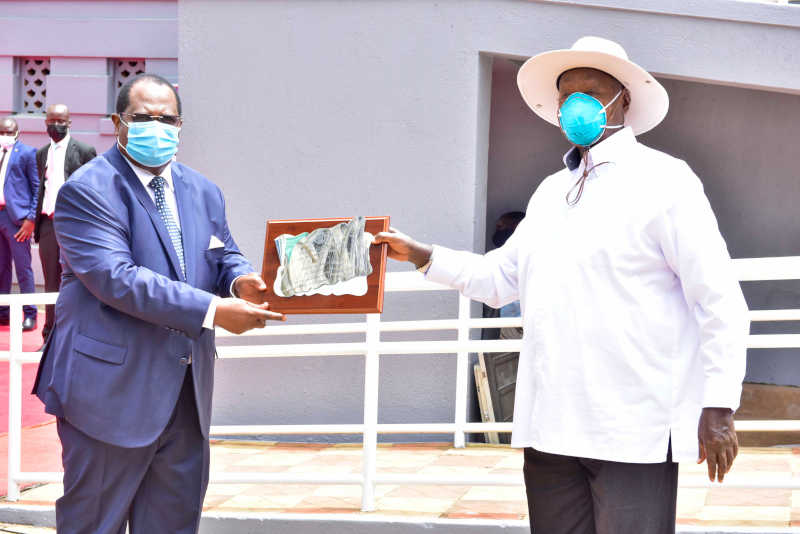
Former Chief Justice Benjamin Odoki also received the Ben Kiwanuka award from President Museveni
Moving on, bail isn’t the only example which demonstrates how Tibuhaburwa and members of his regime have loaded it over the judiciary in a manner intended to give the impression it is powerless.
One plain case in point is the raid that was committed by Black Mamba unit of the armyon the high court premises in Kampala.
Still few are surprised by Museveni’s latest attack on the judiciary. The president has admitted that on March 1, 2007, he ordered his presidential guard to put on police uniform in raid the high court in Kampala.
Although it ended without the arrest of any judge, as opposed to the Amin-Kiwanuka incident, was for all purposes and intents, an affront on the independence of the third arm of government.
Whoever planned this raid had one objective in his or her mind which was to show the judiciary where power lies and how the courts of law are impotent.
To demonstrate the importance the masterminds attached to the raid, none other than the first son Lt. Gen. Muhoozi Kainerugaba, commanded it. To show further how the planners of the unforgettable siege didn’t care about its grave implications , the raid was carried out in broad day light with soldiers armed with intimidating arsenals and without care to whatsoever regarding the prying eyes of the members of the public and the press.
One of the lawyers who attempted to stop the armed men from accessing the courts of law was roughed up to the extent that his robes and shirt were left in tatters.
Muhoozi and his men gatecrashed into the court premises to re-arrest opposition politician Dr Warren Kifeefe Besigye. The high court had granted bail to Besigye who had been arrested and charged with treason and rape.
Besigye had been arrested after declaring his wish to run against Museveni in much the same way almost all the strongest rivals of Tibuhaburwa or their supporters have been arrested previously.
That the Black Mamba re-arrested Besigye in 2001, goes miles to show how Tibuhaburwa has for a long time been planning how to ban bail.
As a matter of fact, the regime has turned to re-arresting suspects out on bail into a norm up to this day. All it takes for the military to re-arrest a suspect released on bail, is a murmur of disapproval from the president.
Useful History
Speaking during the BenedictoKiwanuka memorial lecture, Tibuhaburwa helped to tell the world how he started opposing bail way back during the making of the 1995 Uganda Constitution.
Museveni told the judges and learned friends that he strongly opposed giving bail to a category of suspects during the Constitution making process, but that Justice Benjamin Odoki– then the chairman of the Constituent Assembly, and his people overpowered him.
In nutshell, what Tibuhaburwa possibly wanted the Odoki commission to do was to adopt the jungle law the successful rebel leader used to summarily execute Zebulon. Should that be the case, you can now see clearly the intentions of the Fountain of Honor.
Tibuhaburwa and his comrades-at-war as well as members of his regime are on record telling the judiciary and parliament and whoever dares to oppose what they desire, to go hang, because the business of determining Uganda’s destiny isn’t theirs but a preserve of the NRM.
The practice of re-arresting suspects released on bail, has degenerated so much so that all that the security men need is to hear the president complain, that they swing into action, and start to hunt for the victim and actually arrest him.
Upon arresting the suspect, the police would quickly prepare charges against him or her before sending the files to the captured office of the DPP who would hurriedly sanction the charges.
After days in detention, the suspect would be arraigned in court, and if the court happens to release him or her on bail, the military will re-arrest the suspect, keep him in detention for days, conjuring up charges on the way to taking him or her to the military court which are subject to the whims of the accuser.
In our case where the parliament, the police, the military, the religious sects, the civil society, the press, the traditional leaders, the law society, the academia name it, are powerless in the face of an overbearing regime, it is paramount to maintain the powers of the judiciary, ,even though, a semblance of it.
This is critical in the sense that a judiciary that works helps to prevail over a State that is erratic or one that seeks to act erratically as well as a parliament that is captured or compromised.
A judiciary that works is one that is capable of standing up to machinations of politicians geared towards eroding the rule of law and, essentially human freedoms.
Sadly, though, in our midst, is quite a number of politicians who don’t want to work alongside the judiciary that works because of their selfish interests.
Comments





